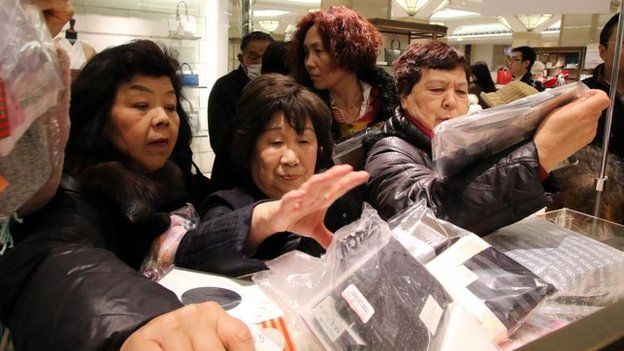Japan to be year late in hitting inflation target
- Published
- comments

The Bank of Japan is trying to get prices in the shops to rise
Bank of Japan (BOJ) governor Haruhiko Kuroda has told me that its inflation target of 2% why the inflation target is not likely to be hit in April
He now believes that it'll take another year - at the end of the 2015 financial year, which is March 2016 - before Japan sees consumer prices rise by 2%.
Nearly two years ago in April 2013, Mr Kuroda vowed to do whatever it took to achieve the 2% inflation target.
The latest figures from November show that the targeted core CPI inflation, which strips out volatile items like food, is just 0.7%, having plunged since last April. It's been dragged down by oil prices which have fallen by about 50% since their peak in the summer. The drop in CPI led to the BOJ pledging to inject more cash to the tune of more than $700bn a year to meet its inflation target and end 15 years of deflation, or price falls.
Mr Kuroda says that because Japan imports pretty much all of its energy needs, oil prices are the reason for why the inflation target is not likely to be hit in April.
However, he expects that growth will pick up and thus the target looks likely to be hit in another year's time.
When I asked if wage rises were required in order to sustain any price increases, he agreed and said to look to the spring wage negotiations between unions and businesses.
Mr Kuroda also said that he looked at the output gap - the difference between potential and actual output - which is small. He believes that Japan is pretty much at full employment. With a low unemployment rate, he expects economic growth to lead to bigger wage rises.
So, is Abenomics working to raise growth? Mr Kuroda said that structural reforms would take time. And that indeed is what the central bank is buying for the Abe government.
But, it alone can't do the heavy lifting - a theme that's heard frequently at Davos, especially as the European Central Bank has today announced that it will also inject cash to try to combat deflation and boost growth. It would do well to heed the lessons of the BOJ in that QE alone is unlikely to deliver all that an economy needs to be revived.